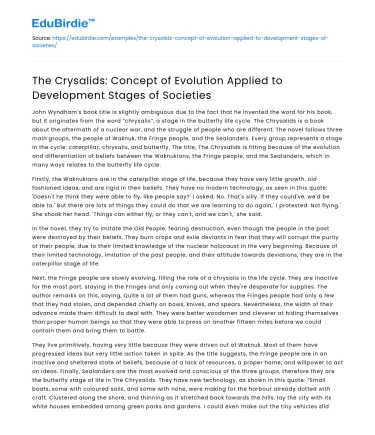John Wyndham’s book title is slightly ambiguous due to the fact that he invented the word for his book, but it originates from the word “chrysalis”, a stage in the butterfly life cycle. The Chrysalids is a book about the aftermath of a nuclear war, and the struggle of people who are different. The novel follows three main groups, the people of Waknuk, the Fringe people, and the Sealanders. Every group represents a stage in the cycle: caterpillar, chrysalis, and butterfly. The title, The Chrysalids is fitting because of the evolution and differentiation of beliefs between the Waknukians, the Fringe people, and the Sealanders, which in many ways relates to the butterfly life cycle.
Firstly, the Waknukians are in the caterpillar stage of life, because they have very little growth, old fashioned ideas, and are rigid in their beliefs. They have no modern technology, as seen in this quote: 'Doesn't he think they were able to fly, like people say?' I asked. No. That's silly. If they could've, we'd be able to.' But there are lots of things they could do that we are learning to do again,' I protested. Not flying.' She shook her head. 'Things can either fly, or they can't, and we can't,' she said.
Save your time!
We can take care of your essay
- Proper editing and formatting
- Free revision, title page, and bibliography
- Flexible prices and money-back guarantee
In the novel, they try to imitate the Old People, fearing destruction, even though the people in the past were destroyed by their beliefs. They burn crops and exile deviants in fear that they will corrupt the purity of their people, due to their limited knowledge of the nuclear holocaust in the very beginning. Because of their limited technology, imitation of the past people, and their attitude towards deviations, they are in the caterpillar stage of life.
Next, the Fringe people are slowly evolving, filling the role of a chrysalis in the life cycle. They are inactive for the most part, staying in the Fringes and only coming out when they're desperate for supplies. The author remarks on this, saying, Quite a lot of them had guns, whereas the Fringes people had only a few that they had stolen, and depended chiefly on bows, knives, and spears. Nevertheless, the width of their advance made them difficult to deal with. They were better woodsmen and cleverer at hiding themselves than proper human beings so that they were able to press on another fifteen miles before we could contain them and bring them to battle.
They live primitively, having very little because they were driven out of Waknuk. Most of them have progressed ideas but very little action taken in spite. As the title suggests, the Fringe people are in an inactive and sheltered state of beliefs, because of a lack of resources, a proper home, and willpower to act on ideas. Finally, Sealanders are the most evolved and conscious of the three groups, therefore they are the butterfly stage of life in The Chrysalids. They have new technology, as shown in this quote: “Small boats, some with coloured sails, and some with none, were making for the harbour already dotted with craft. Clustered along the shore, and thinning as it stretched back towards the hills, lay the city with its white houses embedded among green parks and gardens. I could even make out the tiny vehicles sliding along the wide, tree-bordered avenues. A little inland, beside a square of green, a bright light was blinking from a tower and a fish-shaped machine was floating to the ground”.
They've grown and become more powerful, making their country advance and resemble something like before the nuclear war. They have also accepted and embraced their abilities, making their society more connected to each other, and in many ways, superior. Due to this, the Sealanders are the more superior group in the novel, taking the roles of a butterfly in the life cycle. The main groups of the novel represent the stages of life in a butterfly’s life cycle, making the book title of The Chrysalids relevant.






 Stuck on your essay?
Stuck on your essay?

